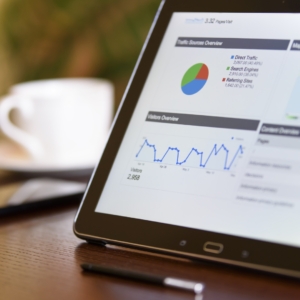Data-Driven Marketing: Boost Your Campaigns with Actionable Insights
 In today’s digital landscape, data-driven marketing has emerged as a powerful strategy for businesses aiming to maximize their marketing efforts. By harnessing the potential of data collection and analysis, marketers can gain valuable insights into their target audience’s preferences, behaviors, and needs. This blog post explores the concept of data-driven marketing and highlights its significant role in creating successful campaigns. Get ready to unlock the full potential of data and revolutionize your marketing approach.
In today’s digital landscape, data-driven marketing has emerged as a powerful strategy for businesses aiming to maximize their marketing efforts. By harnessing the potential of data collection and analysis, marketers can gain valuable insights into their target audience’s preferences, behaviors, and needs. This blog post explores the concept of data-driven marketing and highlights its significant role in creating successful campaigns. Get ready to unlock the full potential of data and revolutionize your marketing approach.
Understanding Data-Driven Marketing
The Importance of Data in Marketing Data plays a pivotal role in modern marketing. It allows businesses to move away from relying solely on intuition and guesswork when making marketing decisions. Instead, marketers can rely on data-driven insights to guide their strategies, ensuring they are backed by evidence and facts.
What is Data-Driven Marketing?
Data-driven marketing refers to the practice of utilizing data and analytics to make informed decisions about marketing campaigns. It involves collecting, analyzing, and interpreting data to gain a deeper understanding of the target audience, their preferences, and their behaviors. These insights enable marketers to create personalized and targeted campaigns that resonate with their audience.
Benefits of Data-Driven Marketing Data-driven marketing offers numerous benefits that contribute to campaign success:
Enhanced Audience Understanding: By analyzing data, marketers gain a comprehensive 
Improved Personalization: Armed with data insights, marketers can tailor their messages and offers to meet the specific needs and preferences of individual customers, enhancing personalization and engagement.
Higher ROI: Data-driven marketing allows for precise targeting, leading to improved conversion rates and higher return on investment (ROI) for marketing campaigns.
Optimized Campaigns: Data analysis helps marketers identify the most effective marketing channels, messaging strategies, and timing for their campaigns, optimizing their efforts for maximum impact.
Data Sources for Marketers To implement data-driven marketing, marketers can leverage various data sources:
First-party Data: This data is collected directly from customers through interactions with a business’s website, mobile app, or other touchpoints. It includes customer profiles, purchase history, and engagement data.
Second-party Data: Second-party data is acquired through partnerships or collaborations with other companies. It can provide additional insights into a target audience that aligns with a marketer’s objectives.
Third-party Data: Third-party data is obtained from external sources, such as data providers, and offers a broader view of consumer behavior and interests. It can supplement first-party data and enhance audience understanding.
Tools and Technologies for Data Collection and Analysis To effectively collect and analyze data, marketers can utilize a range of tools and technologies:
Customer Relationship Management (CRM) Systems: CRM systems help centralize customer data, enabling marketers to track interactions, segment audiences, and personalize communications.

Social Media Listening Tools: These tools monitor social media platforms for mentions, comments, and sentiments related to a brand or industry. They provide insights into customer opinions, preferences, and trends.
Surveys and Questionnaires: Surveys and questionnaires enable marketers to gather direct feedback from customers, uncovering valuable insights into their preferences, needs, and satisfaction levels.
Leveraging Data for Targeting
Identifying and Segmenting Your Target Audience
To leverage data effectively, marketers must identify and segment their target audience. By dividing the broader audience into smaller segments based on characteristics like demographics, interests, or purchase behavior, marketers can create highly targeted campaigns that resonate with specific customer groups.
Utilizing Demographic and Psychographic
Data Demographic data, such as age, gender, location, and income, provides a foundation for understanding customers’ basic characteristics. Psychographic data delves deeper into customers’ attitudes, values, interests, and lifestyles. Combining demographic and psychographic insights allows marketers to create more personalized and relevant campaigns.
Behavioral Tracking and Analysis
Tracking and analyzing customer behavior data provide valuable insights into how customers interact with a brand across various touchpoints. This data includes browsing patterns, purchase history, time spent on different pages, and more. By understanding customer behavior, marketers can tailor their campaigns to align with customers’ preferences and intent.
Predictive Analytics for Targeting
Predictive analytics leverages historical data and statistical algorithms to anticipate future customer behavior. By analyzing patterns and trends, marketers can identify potential customer actions, such as the likelihood to purchase or churn. This information empowers marketers to proactively target specific customer segments with personalized offers and recommendations.
Customer Journey Mapping
Customer journey mapping involves visualizing and understanding the steps a customer takes
Crafting Effective Data-Driven Campaigns
Personalization and Customization: Personalization is at the heart of data-driven marketing. By leveraging customer data, marketers can create personalized experiences that resonate with individual customers. Personalization can be achieved through dynamic content, tailored product recommendations, personalized email marketing, and more. The goal is to make each customer feel understood and valued.
Dynamic Content Creation: Dynamic content allows marketers to tailor their messages and offers based on customer data. By dynamically changing elements of a campaign, such as images, headlines, or product recommendations, marketers can deliver highly relevant and engaging content. Dynamic content can be implemented across various channels, including websites, emails, and advertisements.
A/B Testing and Optimization: A/B testing involves comparing two versions of a marketing element (e.g., subject lines, landing pages, or calls-to-action) to determine which performs better. By testing different variations and analyzing the results, marketers can optimize their campaigns and make data-backed decisions to improve conversion rates and overall performance.
Automation and Workflow: Management Marketing automation tools streamline repetitive tasks, allowing marketers to focus on strategic activities. By automating processes such as email marketing, lead nurturing, and social media posting, marketers can deliver timely and relevant content to customers based on their behavior and preferences. Workflow management tools help coordinate and track these automated activities.
Retargeting and Remarketing Strategies: Retargeting and remarketing strategies involve reaching out to customers who have previously interacted with a brand but haven’t converted. By using data to identify these individuals, marketers can create targeted campaigns aimed at re-engaging them. 
Performance Monitoring and Reporting: Data-driven marketing is an iterative process. Marketers need to continuously monitor campaign performance, track key metrics, and analyze results. By measuring the success of campaigns against predefined goals and KPIs, marketers can identify areas for improvement and make data-driven adjustments to optimize future campaigns.
Overcoming Challenges and Best Practices
Ensuring Data Accuracy and Quality: Accurate and high-quality data is crucial for effective data-driven marketing. Marketers must ensure data is collected, stored, and processed securely. Regular data cleansing and validation processes help maintain data integrity and reliability.
Addressing Privacy and Compliance: Concerns With the increasing focus on data privacy, marketers must comply with relevant regulations, such as GDPR or CCPA. Obtaining proper consent for data collection and handling sensitive customer information responsibly builds trust with customers and protects their privacy.
Building a Data-Driven Culture: Data-driven marketing requires a cultural shift within organizations. It involves promoting a data-driven mindset and fostering a culture that values data-driven decision-making. This includes providing training and resources to empower marketers with data skills and encouraging collaboration between marketing and data teams.
Continuous Learning and Improvement: Data-driven marketing is an evolving field, and staying up to date with industry trends, tools, and techniques is essential. Marketers should invest in ongoing learning, attend industry events, and engage in knowledge-sharing communities to continuously enhance their data-driven marketing expertise.
Collaborating with Data Analysts and Specialists: Working closely with data analysts and specialists can greatly enhance the effectiveness of data-driven marketing. These professionals have expertise in data collection, analysis, and interpretation, and can provide valuable insights to optimize campaigns and identify untapped opportunities.
Conclusion
Data-driven marketing is no longer a luxury; it has become a necessity for marketers aiming to thrive in a competitive landscape. By leveraging data insights, businesses can supercharge their campaigns, maximize their return on investment, and build stronger connections with their target audience. Embrace the power of data-driven marketing today and revolutionize your marketing approach. Remember, success lies in understanding your audience and crafting highly personalized experiences that resonate with their needs and aspirations.




